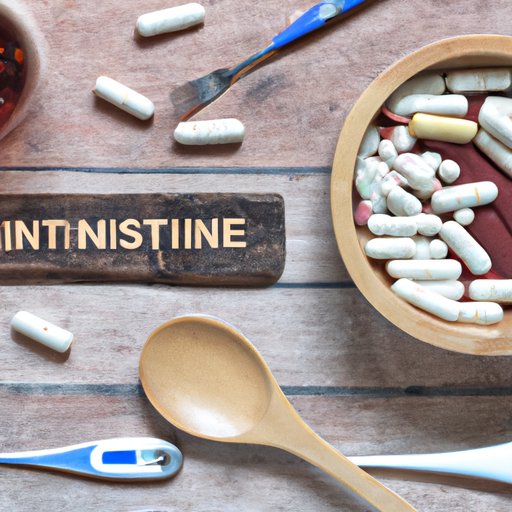
Introduction
If you’ve ever experienced the discomfort of inflamed intestines, you know just how unpleasant it can be. Inflammation in the gut can lead to digestive problems such as bloating, gas, and abdominal pain. It can also contribute to more serious conditions such as inflammatory bowel disease. If you’re dealing with inflammation in your gut, it’s important to take steps to calm and soothe your intestines. In this article, we’ll explore a variety of techniques you can use to reduce inflammation and promote gut health.
Diet Changes
The foods you eat can have a big impact on the health of your gut. Inflammation in the gut is often caused by a poor diet that’s high in processed foods and low in fiber. To reduce inflammation, it’s important to make dietary changes that promote gut health.
Some foods to avoid include processed snacks, sugary drinks, and fried foods. Instead, focus on incorporating anti-inflammatory foods such as leafy greens, omega-3 rich fish, and colorful fruits and vegetables. Fermented foods such as kefir, kimchi, and sauerkraut are also great additions to your diet, as they help promote a healthy gut microbiome.
Stress Reduction
Did you know that stress can contribute to inflammation in the gut? If you’re dealing with inflamed intestines, it’s important to find ways to reduce stress in your life. This can include techniques such as yoga, meditation, and deep breathing exercises. You can also incorporate stress-reducing activities into your daily routine, such as taking a walk outside or spending time with a loved one.
Probiotic Supplements
Probiotic supplements are another effective way to promote gut health and reduce inflammation. Probiotics are live bacteria that help support a healthy gut microbiome. There are a variety of different probiotic strains, each with their own unique benefits. Look for a high-quality probiotic supplement that contains strains such as Lactobacillus acidophilus or Bifidobacterium bifidum.
It’s important to follow dosage and safety guidelines when taking probiotic supplements. Talk to your healthcare provider to determine the appropriate dosage for your needs.
Herbal Remedies
Natural remedies such as ginger, turmeric, or peppermint can also be effective at reducing inflammation in the gut. Ginger and turmeric are both anti-inflammatory spices that can be incorporated into meals or taken as supplements. Peppermint is also a soothing herb that can help calm the digestive system.
When using herbal remedies, it’s important to follow safe guidelines and talk to your healthcare provider if you have any concerns.
Exercise
Regular exercise is great for overall health, but it can also have a positive impact on gut health. Exercise helps stimulate the digestive system and promotes the growth of beneficial gut bacteria. Aim for at least 30 minutes of exercise per day, such as brisk walking, jogging, or cycling.
If you’re new to exercise, start slowly and gradually build up to more intense workouts. Remember to listen to your body and stop exercising if you experience any pain or discomfort.
Hydration
Staying hydrated is important for overall health, but it’s also essential for gut health. Dehydration can contribute to constipation and other digestive problems. Aim to drink at least eight glasses of water per day, and consider incorporating hydrating foods such as watermelon, cucumbers, and strawberries into your diet.
Medication
In some cases, medication may be necessary to calm inflamed intestines. Over-the-counter medications such as anti-diarrheals and antacids may be helpful for managing symptoms. Prescription medications such as antibiotics or immunosuppressants may also be necessary for more serious cases of inflammation in the gut.
It’s important to consult with a healthcare provider before taking any medication to ensure that it’s safe and appropriate for your needs.
Conclusion
Inflamed intestines can be uncomfortable and even debilitating. However, by making dietary changes, reducing stress, incorporating probiotic supplements, taking herbal remedies, exercising regularly, staying hydrated, and, if needed, taking medication, you can calm inflammation and promote gut health. Remember to be gentle with yourself and listen to your body. With time and patience, you can find relief from inflamed intestines and enjoy better digestive health.





